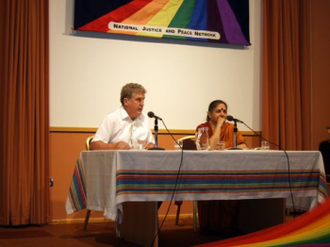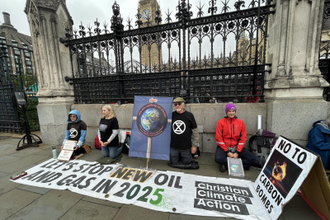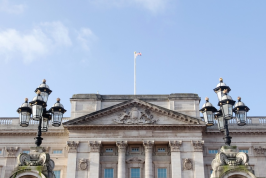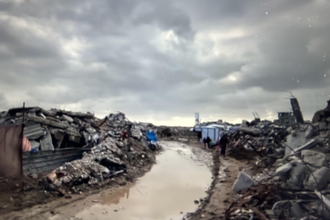Countdown to the Environment Encyclical: 7. Commodifying Creation's Gifts

Fr Sean McDonagh, Vandana Shiva at the 2010 Justice and Peace conference
Who can remember the great Indian ecologist Vandana Shiva speaking at the 2010 annual conference of the National Justice and Peace Network (NJPN) on 'Food'? A packed hall of 400 people from Catholic dioceses and agencies in Britain heard her explain that rather than seeing nature as having integrity of its own, the corporate world tends to view nature as a source of raw materials to be acquired and patented.
In her books - such as 'Biopiracy - the Plunder of Nature and Knowledge' and 'Water Wars: Privatisation, Pollution and Profit' - she had warned that when profit and greed are the sole motivators for business activity then the value of the environment will be seen only in monetary terms.
There was enthusiastic applause when she suggested that "corporate policy is the biggest threat to food security on the planet". She warned that we could witness in our lifetimes "the total disappearance of biodiversity from our farms, the disappearance of small farmers, and the end of real food and our food freedom".
I am recalling Vandana's words because they underline that the environment issue is not simply about the environment, but about a range of values and practices - particularly in the economic sphere - which indicate that a very different view of God's creation prevails than that expressed by Pope Francis in May 2014: "Creation is a gift, it is a wonderful gift that God has given us, so that we care for it and we use it for the benefit of all, always with great respect and gratitude". Environmental degradation and global poverty are symptomatic of a deeper malaise.
In a submission last October to the Pontifical Council for Justice and Peace in Rome, which was charged with responsibility for the environment encyclical, the NJPN expressed concern that the food system, genetic resources and water systems are increasingly in the grip of large corporations seeking profit. "An economy based on nuclear energy, oil and coal, fracking, genetic engineering, toxic chemicals or the overexploitation of our forests and seas will never be sustainable or green" warned the NJPN; "instead, a fair and green economy is one that provides sustainable livelihoods for all while fully respecting ecological limits."
The NJPN suggested the Vatican could challenge EU plans for a dangerous new trade deal called the Transatlantic Trade and Investment Partnership (TTIP). For the first time on a grand scale, corporations might be able to sue governments if they make public policy decisions which could harm their future profits. Regulation which currently protects people, public services and the environment could be removed. In fact, this very day the European parliament cancelled a vote on TTIP after huge public pressure - and I am proud to be one of the two million EU citizens who signed a petition against the TTIP deal.
The NJPN also wrote that while there is broad agreement that we must reduce carbon emissions, clean up polluted water sources and preserve biodiversity, there is little understanding that until we change our development paradigm, our efforts will be insufficient. "We would expect the encyclical to push for a new measure of progress" said NJPN; "Gross Domestic Product encourages constant growth, the commodification of nature, and overconsumption of the Earth's finite resources". The NJPN pointed to work developing new economics and the 'transition' movements around the world which are making a change to a low carbon economy which could bring opportunities for green growth without destroying the environment.
Then there is the issue of militarism. Expenditure on arms leaves fewer resources for sustainable development and poverty alleviation. Expenditure on nuclear weapons is a particularly dangerous moral evil, and, in addition, weapons testing has polluted the environment. Depleted uranium used in war has poisoned bio-regions such as parts of Iraq. The NJPN suggested that policy responses to climate change could include disarmament and budget reallocations of military expenditure, especially since military activity around the world produces significant quantities of greenhouse gases.
It is almost certain that the term "Integral Ecology" will appear in the encyclical. This represents a recognition that humanity now faces crises on multiple fronts: extreme economic injustices, increased competition for resources including land and water, a severely degraded natural world, failing nation states, and a climate on the verge of spinning out of control. The term realises that these crises are not independent, but closely intertwined.
Catholic organisations around the world have long known that. In 2010, the Catholic Bishops of DR Congo travelled to the United States to raise awareness of conflict surrounding the mineral Coltan - a component of mobile phones and laptops. Several million people have been displaced and killed in mining areas and gorillas have been hunted for food to the point that they are now listed as endangered. The bishops urged the US Department of State to require companies listed on the New York Stock Exchange to disclose in annual reports the country of origin of Coltan, Tin and Tungsten, and if the country of origin was the DR Congo or a bordering country, also to disclose the mine of origin. In March this year, US and Canadian bishops supported their Latin American counterparts in Washington who were testifying over the environmental and social ills wrought by extractive industries, such as mining and logging. They particularly highlighted human rights and environmental violations in the Amazon River Basin, calling for greater protection of the Earth and the 40 million people in the region, including three million vulnerable indigenous people.
Integral Ecology revisions the relationship between the human being and the natural world. Perhaps the new encyclical will suggest that the social and ecological costs of our development model need to be reviewed, urgently. This seems to be frightening the business world, but it shouldn't. The Vatican will try to highlight that there are mutual benefits to everyone for bridging economic and ecological interests.
Pope Francis said in February: "A Christian who does not protect creation, who does not let it grow, is a Christian who does not care about the work of God." Both the poorest people in the world and the Earth itself need champions to bring healing. Through his environment encyclical our Pope is likely to be one of them.
See NJPN submission at: www.columbans.co.uk/news/anticipating-2015-environment-encyclical/


















